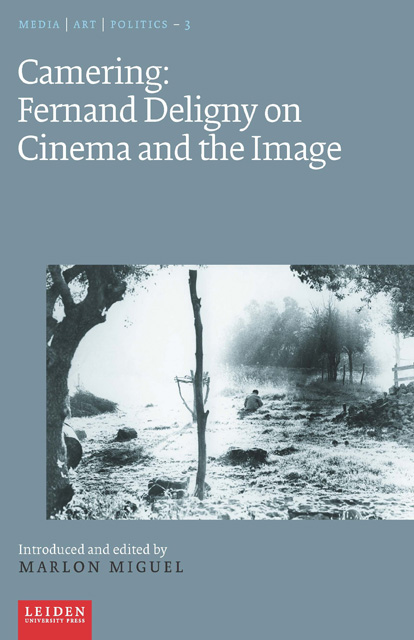Book contents
- Frontmatter
- Contents
- Epigraph [1996]
- Translator’s Note
- General Introduction
- Cinema. Cine-Club [1934]
- The Camera, a Pedagogical Tool [1955]
- He’s Still One of Us [1971]
- Camering [1977]
- Miscreating [1979]
- Camering [1982]
- The Alga and the Fungus [1982]
- Fossils Have a Hard Life: Apropos of the Image [1982]
- Camering [1978-1983]
- The Distinctiveness of the IMAGEs [1988]
- What Is Not Seen (by the Self ) [1990]
- Postface. Minor Gestures, Minor Media
General Introduction
Published online by Cambridge University Press: 16 November 2022
- Frontmatter
- Contents
- Epigraph [1996]
- Translator’s Note
- General Introduction
- Cinema. Cine-Club [1934]
- The Camera, a Pedagogical Tool [1955]
- He’s Still One of Us [1971]
- Camering [1977]
- Miscreating [1979]
- Camering [1982]
- The Alga and the Fungus [1982]
- Fossils Have a Hard Life: Apropos of the Image [1982]
- Camering [1978-1983]
- The Distinctiveness of the IMAGEs [1988]
- What Is Not Seen (by the Self ) [1990]
- Postface. Minor Gestures, Minor Media
Summary
Cinema on the Margins and in the Centre of Deligny's Experiments
Cinema occupies an ambiguous position in the work of Fernand Deligny: it is both central and marginal. For Deligny, cinema constitutes a space of practice as well as one of conceptual speculation. Present to a greater or lesser degree in different periods of his life, it is nonetheless a common thread that runs through more than fifty years of clinical, pedagogical, and socio-political experimentation.
If Deligny's work has for decades been associated with pedagogy and the so-called social ‘maladjustment’ of children and adolescents; if as a result of the renewed interest in his work from the late 2000s his writing has come to be associated with a style both conceptual and poetical, the crucial relationship it maintained with cinema and the image continues to be a blind spot. In the French clinical and cinematographic context, there has been renewed interest in certain of ‘his’ films, including Le Moindre geste (The Slightest Gesture, 1971) and Ce Gamin, là (That Kid, There, 1975). Yet very little has been written about the ways in which the cinematographic practice was essentially interwoven in Deligny's experiments or how speculative reflection on the image constituted a vital line of his thought.
This blind spot in the reception of Deligny's work is due first to the fact that the majority of his texts on cinema and the image have remained unpublished until now. Many were discovered only recently during the organisation of his archives. Camering: Fernand Deligny on Cinema and the Image is a first step towards filling this gap. Its title is taken from a series of texts and notes that date from the late 1970s, which Deligny called camérer. Three of them, the most important and polished pieces, are published in Camering.
This volume reunites, in chronological order, pieces written in different styles between 1934 and 1996. They offer an overview of Deligny's involvement with cinema, beginning with a short review he wrote about three films screened at a cineclub for the journal Lille Université. There is a large gap between this piece and the two that follow: ‘The Camera, a Pedagogical Tool’ concerns Deligny's first practical experiment with the camera, while ‘He's Still One of Us’ is a reflection on The Slightest Gesture.
- Type
- Chapter
- Information
- Camering Fernand Deligny on Cinema and the Image , pp. 15 - 54Publisher: Amsterdam University PressPrint publication year: 2022



